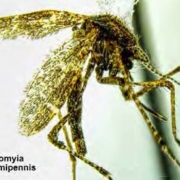New Mosquito Discovery Highlights CMCD’s Lab, Research Team

By Patrick Linn, MS, MSHAPI
Executive Director, Collier Mosquito Control District
In November, Collier Mosquito Control District (CMCD) laboratory technician Hunter Martin made an interesting discovery while performing routine mosquito surveillance in Collier Seminole State Park. In one of the traps, he found three female Aedeomyia squamipennis mosquitoes. Ad. squamipennis is native to Central and South America and was first discovered in the United States in 2017. Martin’s discovery marks the first time this mosquito species has been found in Collier County, bringing the total number of species in the county to 51.
Since first observed in Miami in 2017, the species has gradually expanded its range throughout southern Florida. This mosquito species is known to carry viruses such as Venezuelan Equine Encephalitis and avian malaria. However, this mosquito currently does not pose a significant public health risk due to its low population in Florida and preference for drawing blood from birds rather than humans.
CMCD’s in-house laboratory made this discovery possible and highlights the community benefits of having a dedicated mosquito control lab in Collier County. To effectively control mosquitoes in Collier County, we must know what we are up against. Mosquito behavior and treatment material resistance can vary depending on the species. As part of our integrated mosquito management plan, knowing what species are prominent in a given area is vital to controlling their population. New Mosquito Discovery Highlights CMCD’s Lab, Research Team
In addition to assisting in making treatment decisions, our in-house lab allows us to test mosquitoes trapped locally for tropical diseases, such as dengue or Zika. Without this local testing capability, specimens would go to the state lab. By doing these tests in-house, we have the results within 24 hours rather than waiting weeks to get the results back from the state. This time difference can save lives. Quite simply, if we find disease in local mosquitoes, we can make more timely decisions to target the area where the disease is and limit potential public health threats.
The benefits of rapid testing were seen in other parts of the state last year, as Florida experienced its first outbreak of locally acquired malaria in 20 years. Malaria was first reported last May in Sarasota County, and local mosquito control experts swiftly sprang into action. Through testing mosquito pools, they were able to locate the likely source of the outbreak. Control efforts in Sarasota and Manatee Counties limited the outbreak to seven total cases, and the public health advisory was lifted after the counties found no new malaria cases after mid-July.
The science behind mosquito control is a valuable tool in our public health arsenal, helping to keep our community safe and comfortable. The work our scientists do in our lab also makes an impact statewide, as demonstrated by the recent discovery of Aedeomyia squamipennis in Collier County. Sharing the knowledge that this mosquito is moving throughout the state helps keep neighboring counties aware that this new mosquito to Southwest Florida is likely in their areas as well.
To learn more about the Florida Mosquito Control Association, visit their website at www.yourfmca.org.
To learn more about the District or to sign up to receive treatment notifications, visit our website at www.cmcd.org.
The Collier Mosquito Control District works to safeguard the health and wellbeing of our residents through the safest and most economical means available. If you would like more information about how we control mosquitoes, please visit our website at www.cmcd.org or call us 239-436-1000




Leave a Reply
Want to join the discussion?Feel free to contribute!